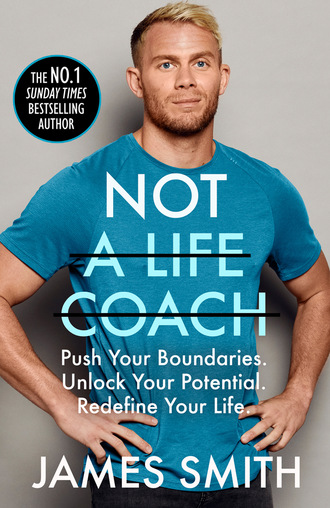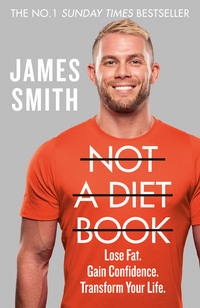
Полная версия
Not a Life Coach
If I look back at my biggest failures, they are the aspects of my life I am most grateful for. If you think about yours, I am sure you would agree. I don’t need much from you right now – just that you cherish the next hurdle instead of worrying about it. Time spent worrying is time wasted, let me tell you that for free.
So it’s not just who we are, it’s not just what we do; it’s not just what is going to happen and it’s not just dwelling on what has happened. Sometimes we need to sit and think about where we are right now and who we are surrounding ourselves with, to allow us to consider whether we need to adjust these things for long-term positive change. If you want a tree to grow to its full potential, you’d best think carefully about where you plant it.
* Law of reciprocity: when someone does something nice for you, you will have a deep-rooted psychological urge to do something nice in return.
PART II
A value isn’t just how much something costs; it’s an integral part of our persona and identity. It signifies what we determine as being important in life, it’s how we decide what we want, yet so many of us lose sight of our values. Our values are reflected in how we behave each and every day, so I hope that I can help you to rediscover what they are and ensure you pay greater attention to them.
Values of Success: So, What If It All Goes Wrong?
When I was twenty-eight, I had what I can only call ‘a moment’. During this period of my life, I was experiencing what many would call relative ‘success’. I’d get high fives walking down the beach in Sydney and requests for selfies on nights out from people who watched my content. Considering that for 90 per cent of my life up until writing this book that had never happened before, it was hugely overwhelming. You see, when people see you have a big social media following, they paint a picture of your life, and there’s often not a lot of regard for how new it is for you. For a stranger to know so much about you or feel like they know you already is a phenomenon unique to the age of social media, and although I have so much gratitude for it, it’s also kind of weird. Brilliantly weird, but weird. However, before getting into the social science of social media I want to tell you about a time when I was sitting in a steak restaurant in Sydney.
It was a summer’s evening and I was with friends. I ordered my steak and had a little moment when I just looked around and took in my surroundings. It was a nice, normal evening. People were happy, the sun was setting and I was with good friends. I sat there and thought to myself: do you know what? If nothing works out, I’ll just work here in this steak restaurant. I’ll work the 4-or-5-p.m.-until-close shift, I’ll do it five or six nights a week. During the day, I’ll go the beach, I’ll learn to surf and I’ll get a dog. I’ll give the dog my attention all day. I’ll walk him and tie him up in a nice spot when I surf and then go home to nap or tan before my evening shift.
This isn’t to say that we can all work in a restaurant as an easy way out of chasing our ambitions, but instead that ‘success’ can be found in places other people may not see from the outside. And that’s fine too, because success is internal and not a value we should chase to please other people.
A simple job that isn’t stressful may not make you the best-paid person in your friendship group, but it could make you a better friend, a better student in your hobby and even a more attentive lover. We must always refer back to the metrics of success and remove our egos from any idea of the good life. The restaurant wasn’t an ambition, but more of a fail-safe that made me feel more confident to take risks.
Since that ‘moment’ over the medium-rare steak I have taken up Brazilian jiu jitsu and I will continue to devote myself to being a student of the sport until I physically can’t do it any more. I am well aware that I’ll never be considered successful in it to the outside world; I mean, think about it – realistically, I am just not going to be a superstar jiu jitsu athlete. That doesn’t mean that it can’t make me happy every single day, though (plus, that’s only about success to the outside world). To me, the feat of just obtaining my next belt promotion could be enough, as I set my own metrics for success. For someone else, it could be different; it could just be turning up to three sessions a week. Only if I compare myself to the best competitors in the world can I be left feeling deflated. Do you see the correlation with our work life now? I’ll talk about the humility that the sport has given me later on in the book, but for now, understand that between someone who does the sport as a hobby and someone else who competes and wins at the highest level, both can experience tremendous success based on their own metrics and values of what that means to them – and no one can take that away from them.
I want you to consider this, too. I could win a competition at blue belt in the next year. That could easily make me just as happy as someone else would be winning the worldwide black belt title. What I want you to realize is that the level of happiness we’d feel could, and most likely would, be exactly the same. Where the level of accomplishment sits on the scale doesn’t influence the amount of happiness you get from it. What if I told you that I was just as happy from two very different victories: the first was when a man sat next to me in a café in the UK five years ago. This man paused, looked at me and said, ‘I like reading your blogs.’ To me, that was huge; although it was only a mile from the gym I was working in and in the very café in which I wrote them I could not believe my luck. The second was the recognition in becoming a Sunday Times bestselling author. But it felt the same. The scale of the victories, objectively speaking, is substantially different; but how they felt to me was the same. You do not need to be the best in the world to be happy, as long as you choose the level you want to be happy at.
I feel that in the world we live in we’re made to feel that we must be in spectacular professions in order to be happy with them. But we don’t. It’s a bit like being an ‘on paper’ average athlete: as long as you’re happy doing it, then who can say different? I used to date a Norwegian girl, and I’ll never forget a conversation I once had with her dad. (He only said two things to me for the entire year and a bit that I dated his daughter.) We were out food shopping, and there was a lad, a good-looking lad, sat at the checkout of what, truth be told, was a bit of a shithole of a supermarket. The lad spoke fantastic English and had good banter (I’m pretty sure he made me laugh with an inside joke only British people would understand).
As we got out to the car park I said, ‘I can’t understand what a good-looking lad is doing in a job like that. How is he not doing something better – better paid or more interesting?’
And her dad turned to me and said, ‘Well, James, some people behind closed doors have very complicated lives and therefore require very simple jobs.’
I’d never thought about it like that. And I’ve never forgotten it either. The second thing he told me was: ‘All Norwegians are born with skis on their feet. Some, however, decide when they grow up to take them off.’ That made me feel a lot better – partly about how terrible I was at skiing, but that wasn’t quite his point. (In fact, I may have to tap him up for some more nuggets in this book as we go on.) I think his point (which means more to me the more I think about it) was that in life we are all born with everything we need to accomplish anything, but along the way, some of us, for whatever reason, feel the need to remove our skis, to throw in the towel and no longer pursue what we set out to do. Anyone who has ever gone skiing will testify to two things: in most cases, especially when you start out, those skis will come off; however, just as easily, they click back on. And that’s not influenced by how long they have been off for either. No one is born good at skiing; some decide to continue to get better, while others do not.
Skál (sk-ull): a Norwegian word for ‘cheers’ or ‘good health’ – a salute or a toast, as to an admired person or group. They’ll understand it if they’re Danish, Swedish, Faroese or Icelandic.
So, take a deep breath, think about your job or your profession and ask yourself if you’re getting caught up with someone else’s metrics for success or if you are being true to your own. If I were to compare my hobby with those who are the best at it, within a hundredth of a second I could go from content to disheartened. Whose rules are you playing by? Whose blueprint are you following? Yours or someone else’s?
Sunk Cost Fallacy Revisited
No matter how much you have already invested, only your assessment of the future costs and benefits counts.
Rolf Dobelli
For those who have not read Not a Diet Book, the sunk cost fallacy is where people struggle to walk away from something due to the amount of time, money or effort already invested in it. But these factors should not hold weight in any decision-making process around continuing or discontinuing whatever it is you’re currently invested in, whether that be a person or a profession.
If you invested 10 per cent of your savings in stocks two years ago, but they haven’t moved more than 1 per cent since then, do you feel obliged to hold on to them or to let them go? I bet in your head you’d be leaning towards keeping them – it’s been two years of waiting for them to increase in value, so why waste that amount of time, right?
Or take a marriage. It is based on partnership, on love, on happiness and wanting to share the great moments of life together, yet so many are unhappy. Why? The kids? Well, although yes, I agree, separated parents can be more dysfunctional than those together, surely two happy adults apart would be more functional than two unhappy ones living together under one roof? So, why do so many stay together? Because they’ve already invested so much in the marriage. Therefore, the decision is made based on the time spent in the relationship or the marriage, not the quality of it.
I know I made this point in my first book, but it’s important to make it clear again. You must only make judgements based on where you are at now, not where you were at previously and not where you might be. This is living in the present. The past no longer exists and it’s time you came to terms with that reality. What has happened occurred when the rock we live on was in a different part of the universe, and it will never revisit that location. To believe otherwise is naive.
THE MONTY HALL PROBLEM
Here’s a prime example of our fear around making decisions when the outcome is partly unknown: there are three doors, one of which has your favourite car behind it, while the other two have goats behind them. I let you pick any one of the three doors, and once you have selected it, I pick one of the other two (I know where the goats are). I open a door to show you a goat, and I then give you the opportunity to switch doors: do you take the switch? In most cases, you won’t. People don’t. They hold on tighter to their initial choice, even though more information is available to them. Your odds of winning go from 33 per cent to 66 per cent in what is known as ‘the Monty Hall problem’ if you switch. But although the odds are doubled in the case of switching, only around 13 per cent of people choose to do so given the opportunity.6
Your future is malleable, but I don’t want you to plan for that either. To be a future-planning person could cause you to neglect the present. Your today constructs your tomorrow. So, don’t try to step ahead or jump past a crucial step which is right now. The future is not in your full control, your past has happened, so you’re only left with right now. To make judgements based on your past is to make the same mistake as millions do each and every fucking day, falling victim to the sunk cost fallacy, remaining invested in the past and not the present. It sounds stupid to remind you but I think it’s fitting that I do – to remind you that you cannot change your past, you can’t fix what went wrong, you can’t worry about the situation that happened and you can’t let it affect you now; you can’t wear your failures of the past in the present. Every day is a page in a book: you should never turn back a page, or skip a chapter or worry about what is on the page to come; just stay focused on the page in hand and enjoy each and every line for itself.
So, make decisions based on now, on today, on the second you read this. Do you love your partner right now? Do you want to remain with them longer right now? Do you love your job right now? Stop thinking about how long you have been there; whether a month or a tenure, you can only let today influence your decision, not the amount of time invested. Don’t let the sunk cost fallacy take hold.
There are millions of people losing millions in currency, millions of unhappy marriages and unhappy relationships and millions of investments turning sour because people are too caught up in how long they’ve been invested in them. I know that divorce costs a fortune, but think of the cost of living an unhappy life or wasting time – the most valuable commodity of all.
Realize that sleeping on a futon* when you’re thirty is not the worst thing. You know what’s worse? Sleeping in a king bed next to a wife you’re not really in love with but for some reason you married, and you got a couple kids, and you got a job you hate. You’ll be laying there fantasizing about sleeping on a futon. There’s no risk when you go after a dream. There’s a tremendous amount to risk to playing it safe.
Bill Burr
Many people think of the solar system as being still, the sun chilling in the middle and the planets orbiting. But our solar system moves at around 828,000 km an hour around the Milky Way. It will take us about 230 million years to do a full orbit of that bad boy. So, guess what? That time you messed up really badly last week? We’re now at least 139,104,000 km from that point; it only remains a part of your identity if you choose to let it. We’re 240 million years away from even getting close to where that happened again in the next galaxy orbit, so don’t treat it like it’s in your DNA; it’s a part of the past. The universe continually moves on, so I suggest you do, too.
There are hard decisions to make today that will inevitably get put off until tomorrow and this will be the downfall of millions of people today, and then again the next day, and the next, I’m sure. Are you going to be one of those people? Well, that’s up to you, isn’t it? Turn this page very carefully – because what you do after reading it influences the trajectory of your life.
The whole future lies in uncertainty: live immediately.
Seneca
* Futon: a padded unsprung mattress originating in Japan that can be rolled up or folded in two.
Конец ознакомительного фрагмента.
Текст предоставлен ООО «ЛитРес».
Прочитайте эту книгу целиком, купив полную легальную версию на ЛитРес.
Безопасно оплатить книгу можно банковской картой Visa, MasterCard, Maestro, со счета мобильного телефона, с платежного терминала, в салоне МТС или Связной, через PayPal, WebMoney, Яндекс.Деньги, QIWI Кошелек, бонусными картами или другим удобным Вам способом.



